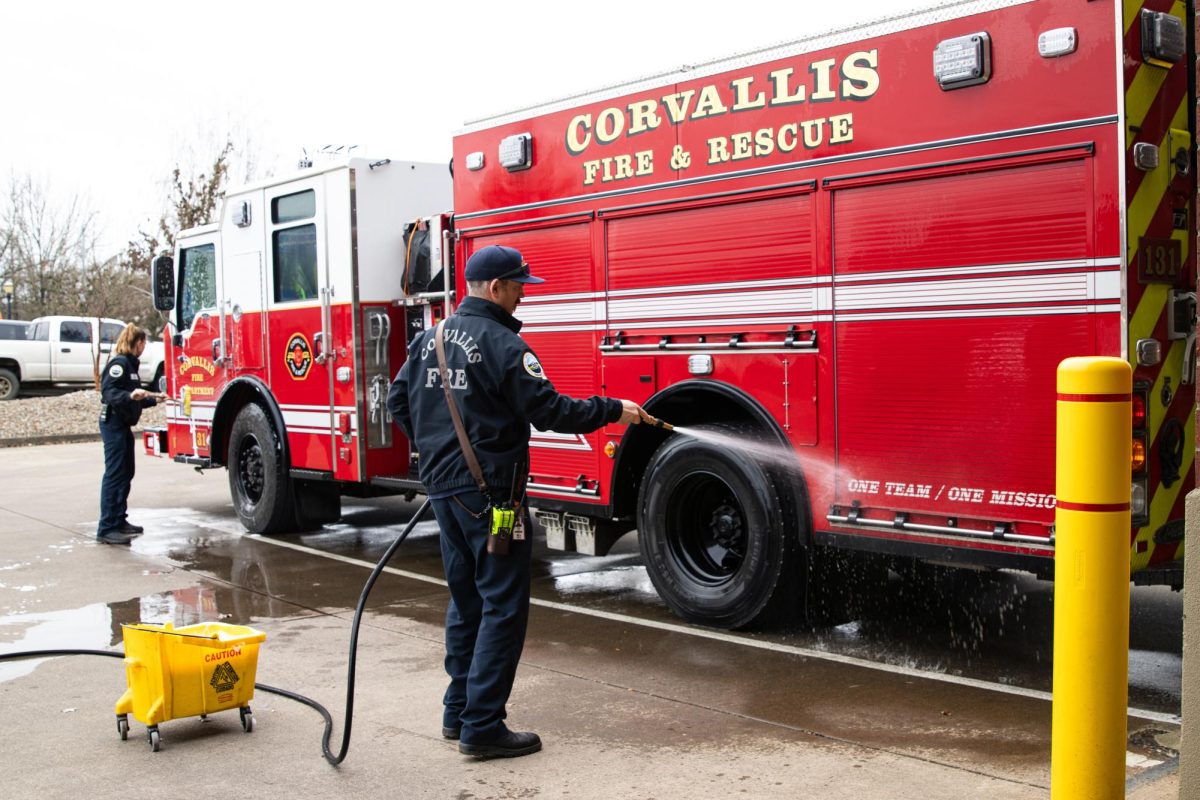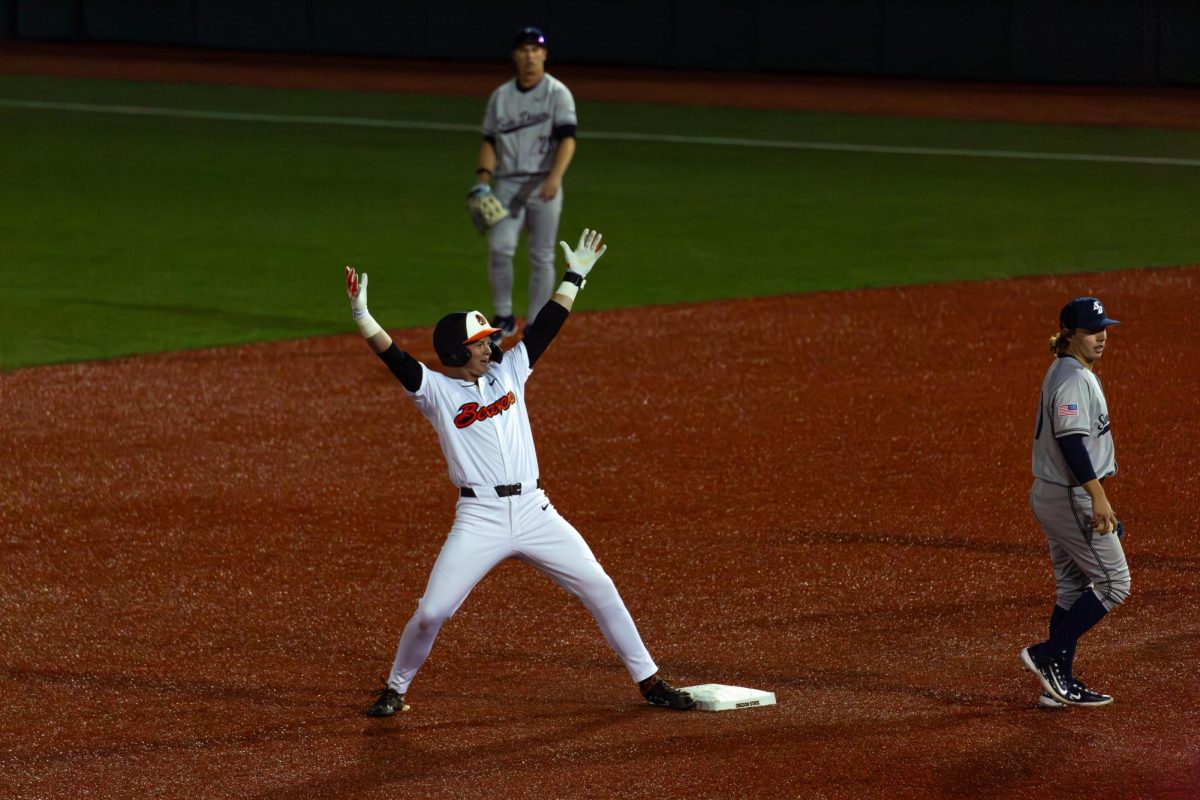Corvallis educators hold Black Lives Matter rally, stress anti-racist action
June 20, 2020
On the last day of the K-12 school year, Friday, June 19, hundreds of mask-wearing Corvallis, Ore. educators, students and community members gathered in front of the Benton County Courthouse at 4 p.m. in solidarity with Black Lives Matter activists around the nation.
This protest, the latest in a string of demonstrations held in downtown Corvallis that have drawn large crowds, focused on racial disparities in education, the experiences of students of color and the role educators play in making students feel welcome, as well as the concept of being “anti-racist.”
Christa Schmeder, Claudia Argo and Marilyn Polo—three Corvallis School District educators and members of the Corvallis Education Association—organized the event, working to have as many people of color speak in front of the crowd as possible.
After Schmeder’s introduction, the first two speakers, both CSD graduates who were enrolled in Dual Immersion programs, discussed how racial inequalities exist in Corvallis, even if some community members are unaware.
Ronny Junkins, a multi-racial student who just completed his junior year of high school, cited racial disparities in education and questioned if Black students around the country are being given the opportunities to reach their full potential.
“I am a student and I am a Black student,” Junkins said. “I want someone to look into an AP classroom and see Black students as belonging.”
Polo, one of the organizers of the demonstration and a Lincoln Elementary School teacher, read a letter written by a biracial student discussing the different treatment she received from her white counterparts in interactions with police officers, airport security and the Corvallis community at large.
Sami Al-Abdrabbuh, the chair of the Corvallis School Board and an engineering Ph.D. candidate at Oregon State University, discussed the district’s racial justice efforts, including a racial equity proclamation signed yesterday, June 18, at the Lonnie B. Harris Black Cultural Center on campus.
The proclamation, put together by the Regional Racial Equity Group formed over a year ago, bears the signature of CSD Superintendent Ryan Noss, as well as Angel Harris, the president of the Corvallis/Albany branch of the NAACP and other nearby school district superintendents.
Al-Abdrabbuh encouraged the mostly white audience to “walk the talk” of being anti-racist, echoing language and ideas used in the proclamation and by event organizers, before leading demonstrators in chants of “Black lives matter,” “Black educators matter” and “Black students matter.”
Anti-racism, distinguished from simply being against racism or not a racist, is a belief system associated with critical theory. It has received increased visibility outside of academia during the weeks following George Floyd’s alleged murder, with scholar Ibram X. Kendi’s book “How to be An Anti-racist” and similar texts reaching the top of Amazon’s non-fiction charts.
The anti-racist concept of allyship requires vulnerability on behalf of white people, and the “calling out” of those who fail to live up fully to its ideals, Al-Abdrabbuh said.
Al-Abdrabbuh also noted that June 19 is Juneteenth—a state holiday celebrating the day some of the last slaves in the U.S. were freed and the emancipation of slaves more broadly.
After Al-Abdrabbuh, several teachers of color from around the district spoke, first in Spanish and then in English, addressing students of color directly, with a message that their lives and voices matter.
Schmeder asked white attendees to commit to being anti-racist allies and to have “hard conversations” about racial issues with friends and family. Both Schmeder and Polo distinguished anti-racism from not being racist, as an active engagement with racial justice rather than passivity.
“I think it’s a really important time for white people to be honest with themselves,” Polo said. “The burden (of having racial justice conversations) should not always be on people of color.”
Even on the last day of the school year, Schmeder gave attendees homework: to take a knee for eight minutes and 46 seconds, the amount of time former Minneapolis police officer Derek Chauvin held his knee on Floyd’s neck, if they had not already done so. The restraint and the length of time has become associated with protests against police brutality, with many commemorations at demonstrations around the country.


















































































![Newspaper clipping from February 25, 1970 in the Daily Barometer showing an article written by Bob Allen, past Barometer Editor. This article was written to spotlight both the student body’s lack of participation with student government at the time in conjunction with their class representatives response. [It’s important to note ASOSU was not structured identically to today’s standards, likely having a president on behalf of each class work together as one entity as opposed to one president representing all classes.]](https://dailybaro.orangemedianetwork.com/wp-content/uploads/2025/03/Screenshot-2025-03-12-1.00.42-PM-e1741811160853.png)
























